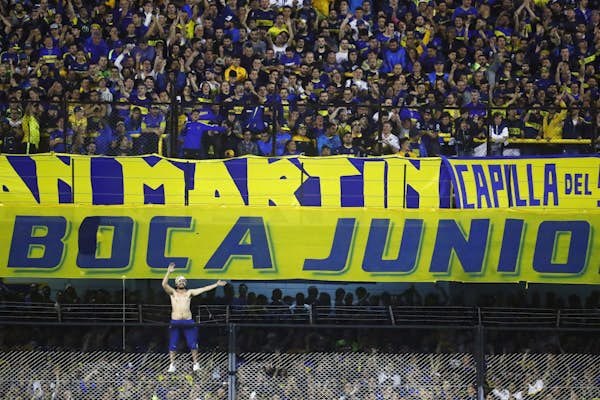Sports are at the core of many Latin American cultures. From football to lucha libre wrestling, there’s something for every sports fan — and it’s all best enjoyed in person. Here are the five best sporting experiences the continent has to offer.

1. Boca Juniors vs. River Plate, Argentina
Almost every country with a soccer league has a clásico, a name reserved for the biggest rivalry. But only one country has a superclásico, and it earned that name for a reason.
In a world full of club rivalries, the one shared by Boca Juniors and River Plate is perhaps the fiercest, with every meeting between the pair being of great significance to their respective fans. Based just minutes apart in Buenos Aires, the clubs boast 69 domestic titles and 10 South American championships between them.
But what really sets this rivalry apart are the fans. Though Argentina’s top-level soccer league, the Primera División, has 24 teams, 70 percent of the country’s fans support either Boca Juniors or River Plate. And those supporters pack the stands at La Bombonera and El Monumental, cheering and chanting with so much enthusiasm that the stadiums shake with the intensity of a strong earthquake. (Seriously.)
Make it happen: The Argentine Primera División runs (almost) year-round. The current season began in July and will end in May 2020. As a visitor, it will be difficult to purchase tickets for Boca Juniors and River Plate home matches, since for safety reasons — and to reward team loyalty — the clubs limit who can buy them directly. It’s easiest to work with a tour agency that has access to tickets and can arrange stadium transportation.

2. Lucha Libre, Mexico City
An equal mix of sport and theater, Lucha Libre is an absolute whirlwind of a spectacle.
Lucha Libre, or freestyle wrestling, blends elements of mythology, rivalry and athletics into a phenomenon that has become a crucial part of Mexico City’s cultural identity. Donning masks and espousing elaborate backstories, the wrestlers, or luchadores, compete for their character’s lives in choreographed matches.
For a luchador, a mask is an identity. Lose a bout, and they can be stripped of the persona they’ve spent years cultivating. With its fast-paced, nonstop action, Lucha Libre is growing in popularity beyond Mexico, and is greatly influences WWE in the United States. But there’s nothing like the original.
Make it happen: Watch a match at Arena México or Arena Coliseo, two historic venues in Mexico City that host Lucha Libre several times a week.

3. Copa América
Fútbol is the world’s most popular sport, and Copa América is one of its biggest events.
Every two years (give or take), the 10 member nations of the South American Football Confederation participate in a month-long tournament to determine the continental champion. First played in 1916, Copa America’s every match is loaded with a century’s worth of on-and off-field competition.
There’s Argentina vs. Uruguay, the world’s most-played international rivalry featuring two countries that helped popularize soccer worldwide. There’s Chile vs. Peru, two underdogs so at-odds that Peruvian players celebrated one of their biggest accomplishments – reaching the 2018 World Cup – by mocking the neighboring nation for failing to qualify. There’s Argentina vs. Brazil, powerhouses that will do anything to gain an edge – including, in 1990, allegedly lacing water bottles with tranquilizers.
With so much history, there are a lot of rivalries. And no matter which game you attend, you’ll see some of the world’s best soccer players battling for their country.
Make it happen: The 2020 Copa América will be co-hosted by Colombia and Argentina – and the tournament won’t be held again until 2024, so start making plans now.

4. Tigres del Licey vs. Aguilas Cibaeñas, Dominican Republic
The Dominican Professional Baseball League is a powerhouse in the sport.
With a disproportionate amount of talent for its size, the Dominican Republic is home to many of baseball’s current and future stars. Much like baseball is considered America’s pastime in the United States, the sport is deeply entrenched in the Caribbean nation’s social fabric.
Tigres del Licey and Aguilas Cibaeñas are among the most successful clubs in the league’s history, so they’re natural rivals. Both teams are loaded with talent, and players liken the intensity of their matchups to that of the New York Yankees and the Boston Red Sox.
It’s an event for the fans, too. With alcohol flowing, bands playing and dancers providing extra entertainment, the Dominican Republic’s most popular sport is worthy of your attention when the rivals meet on the diamond.
Make it happen: The Dominican Professional Baseball League season runs from October to January.

5. The Pan American Games
Every four years, the best athletes from across the Americas participate in the Pan American Games – a sort of mini-Olympics for the North and South American continents.
First held in 1951, the Pan American Games are a source of pride for many smaller nations that might not otherwise enjoy much representation in the Olympics.
The Pan American Games traditionally begin with a torch relay and opening ceremony, and then the competition begins – featuring everything from artistic swimming and archery to water skiing and wrestling.
The events have helped introduce and advance women’s sports in Latin America. After Andrea Vargas earned gold in the 100-meter hurdles for Costa Rica, national media coverage sparked government investment into modern athletic facilities in her hometown.
Make it happen: The 2019 Pan American Games ended in August, but you can start planning for the 2023 Games in Santiago, Chile.
